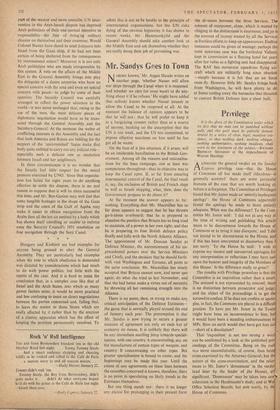Privilege
It is the glory of the Constitution under whi( h we live that no man can be punished without guilt, and this guilt must be publicly demon- strated by a series of clear, legal, manifest evi- dence, so that nothing dark. nothing oblique, nothing authoritative, nothing insidious, shall work to the detriment of the subject.—Rumnan BRINSLEY SHERIDAN at the impeachment of Warren Hastings LTHOUGH the general verdict on the Sunday
A
Express privilege case—that the House of Commons all but made itself ridiculous—is generally accepted. there are some particular features of the case that are worth looking at, before it is, forgotten. The Committee of Privileges found that Mr. Junor made an 'entirely inadequate apology': the House of Commons apparently found the apology he made to them entirely adequate. What was the difference? To the Com- mittee Mr. Junor said : 'I did not in any way at the time of writing and publishing this article mean to be discourteous towards the House of Commons or to bring it into disrepute,' and 'I did not intend to be discourteous to the House, and if this has been interpreted as discourtesy then I am sorry.' To the House he said : '1 wish to express my sincere and unreserved apologies for any interpretation or reflections 1 may have cast upon the honour and integrity of the Members of this House.' Is the difference really so great?
The trouble with Privilege procedure is that the Committee is an inquisition rather than a court. The accused is not represented by counsel; there is no distinction between prosecutor and judge; and the object of the proceedings is to get th accused to confess. If he does not confess or apolo gise, in fact, the Commons are placed in a difficul position To have put Mr. Junor in the Tower might have been an inconvenience to him, but it would have been a standing embarrassment t MPs. How on earth would they have got him ou —short of a dissolution?
That 'inquisition' is not too strong a wor can be confirmed by a look at the published pro ceedings of the Committee. Being on the rac was more uncomfortable, of course, than bein cross-examined by the Attorney-General; but th nature of the cross-examination, and the refer• ences to Mr. Junor's 'demeanour' in the verdict (and later by the leader, of ,the House), art significant. 'Demeanour' may be taken into con' sideration in the Headmaster's study, and at Wel Office Selection Boards, but not; surely, by th House of Commons.


































 Previous page
Previous page